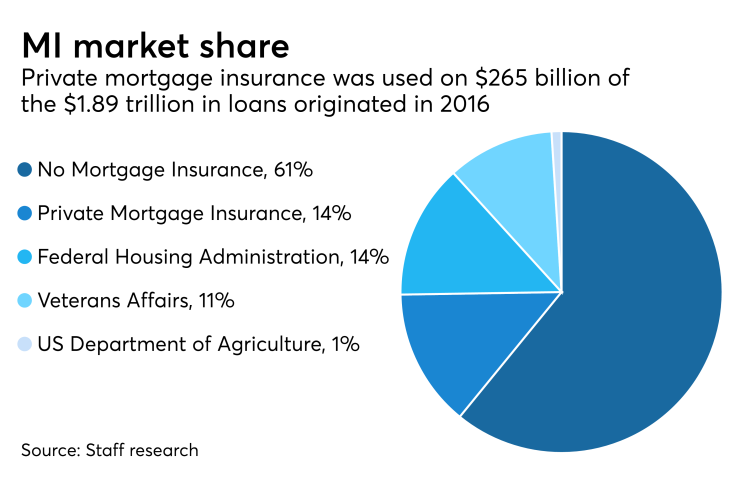
Editor's Note: This is part three of three of the cover story in the May edition of National Mortgage News magazine.
Private mortgage insurance is a commodity and one way for the six carriers to differentiate themselves is to offer add-on services to complement their core product.
For example, Radian Guaranty has marketed job loss protection insurance, MortgageAssure, to its lender clients as an add-on to its policies for the past two years.
During the financial crisis, even with the issues around loan products and underwriting, "the thing that caused a lot of people to lose their homes was related to the fact they couldn't afford to pay their mortgage
As part of Radian's efforts to encourage opportunities for people to buy a home
If the borrower losses his or her job in the first two years of the mortgage, the policy — which is underwritten by an insurer that Radian declined to disclose — makes up to six payments directly to the loan servicer.

Radian pays the premium, not the borrower or the servicer, and it does not affect PMI pricing. The lender does need to agree to participate.
From Radian's standpoint, it benefits because the loan does not go into default. Radian doesn't even know if the borrower has initiated a claim because the borrower contacts the insurer directly, Bazemore said.
"We market it as an advantage of using Radian; 'Why not use Radian and get this additional benefit, instead of going in a different direction?' Obviously because we are one step removed from the consumer,
About 10% of Radian's 2016 new insurance written had a MortgageAssure policy. Because the program is still relatively new, it's too early to tell its impact on Radian's business.
"Our interests are aligned with the consumer. If we can help them get back on track with their loan, then we're not going to take a loss ultimately. — Teresa Bryce Bazemore, former president, Radian
"Our interests are aligned with the consumer. If we can help them get back on track with their loan, then we're not going to take a loss ultimately. That is something that a lot of the time gets missed, when people are talking about the benefits of mortgage insurance, that alignment with the consumer," Bazemore added.
This program also helps to differentiate Radian from the competition, in an industry where the primary product has very little price variation.
Approximately 22% of banks did not require PMI on mortgages with LTVs over 80%, the American Bankers Association's 2017 Real Estate Lending Survey found.
Those products, typically portfolio loans, are another new opportunity for PMI carriers.
Liberty Bank of Middletown, Conn., had a no-PMI loan going up to 90% LTV, but in the low-to-moderate-income Census Bureau tracts where it offered the product, it was not competitive with the market.
"So we made the decision that we would tweak our product and we felt we did not want to do a 97% LTV without mortgage insurance," said Thomas Hylinski, executive vice president and director of retail lending.
After speaking with private mortgage insurers, it decided to offer the loan with the lender-paid PMI. Most lenders that offer LPMI
The consumer is aware there is LPMI on the loan, but they are happy they don't pay for it.

Mortgage insurance "is one more barrier to homeownership. So if we can take that cost out, that allows them to buy a slightly larger home or have a slightly lower payment," Hylinski said.
Not only is Cape Cod Five Cent Savings Bank's namesake locale an expensive housing market, it serves "even more high-cost areas" like Nantucket and Martha's Vineyard, said David Brennan, senior vice president, chief residential and consumer lending officer.
Local real estate prices are driven by second-home purchasers and not the full-time residents. Cape Cod Five has a community workforce housing program for the first responders, teachers, health care workers and others who live in its footprint. There is no mortgage insurance required up to a 90% loan-to-value ratio.
"You can't do anything about home prices, but you're trying to work through the expense side of the mortgage area," Brennan said. Plus the unique nature of the market, with high seasonal employment, does not fit neatly into PMIs' underwriting box.
"Obviously this cuts the cost to the borrower in terms of the insurance cost which could be very expensive depending on how much of a down payment they have. It gives us the ability to underwrite the loan, we don't ask the mortgage insurance company what they think about it," he said. "We have to keep these people in these communities. If we don't have these people in our community, the whole community is potentially at risk."
Besides the no-PMI program, the Orleans, Mass.-based bank also originates loans insured by the Massachusetts Housing Finance Agency. Since 2004, on all MassHousing loans with mortgage insurance the agency has MI Plus, which makes the principal and interest payments on a homeowner's mortgage for up to six months in the case of unemployment.
"That's been a pretty good bridge to help folks out and we do access that program quite frequently," Brennan said.





